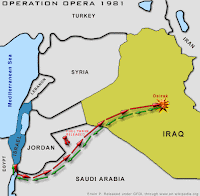 By Dr. Mitchell Bard
By Dr. Mitchell Bard
MitchellBard.com
The Obama Administration is blustering that more drastic sanctions will be imposed on Iran if it does not stop enriching uranium, but Russia and China have undermined the threat by saying they will not support such sanctions. Meanwhile, Israel watches from the sideline and makes its own calculations of its national interest and stirring memories of 1981.
On June 7, 1981, U.S. Ambassador to Israel Samuel Lewis was delivering a briefing before dinner at the Hilton Hotel in Tel Aviv when he was told Prime Minister Menachem Begin was on the phone. Lewis picked up the phone and Begin told him, "Sam, I would like you to convey urgently a message from me to President Reagan. About one hour ago, our Air Force destroyed the nuclear reactor near Baghdad; all the planes have returned safely." At that moment Lewis was shocked, but the fact that Israel had attacked Osirak was not completely unexpected because the possibility had been discussed for months. In fact, almost a year earlier, Begin and his military advisers had told Lewis they were growing increasingly concerned about Iraq's nuclear program. U.S. and Israeli intelligence officers were exchanging information and they agreed that Iraq was seeking to develop a nuclear capability through the use of enriched uranium produced by the Osirak reactor. As is the case today with Iran, however, the two sides disagreed over how much progress the Iraqis were making and when the reactor might go into operation. Begin decided Israel would have to attack before the reactor went critical because of the risk of nuclear fall-out over Baghdad, which would have killed innocent civilians. The Israelis predicted it would go critical by the end of the summer of 1981 while the U.S. experts said it would take at least another two years.
At that moment Lewis was shocked, but the fact that Israel had attacked Osirak was not completely unexpected because the possibility had been discussed for months. In fact, almost a year earlier, Begin and his military advisers had told Lewis they were growing increasingly concerned about Iraq's nuclear program. U.S. and Israeli intelligence officers were exchanging information and they agreed that Iraq was seeking to develop a nuclear capability through the use of enriched uranium produced by the Osirak reactor. As is the case today with Iran, however, the two sides disagreed over how much progress the Iraqis were making and when the reactor might go into operation. Begin decided Israel would have to attack before the reactor went critical because of the risk of nuclear fall-out over Baghdad, which would have killed innocent civilians. The Israelis predicted it would go critical by the end of the summer of 1981 while the U.S. experts said it would take at least another two years.
Lewis said that he and other American officials began to hear a persistent Israeli refrain, "Either the U.S. does something to stop this reactor or we will have to!" This was being done mostly behind the scenes in 1980-81 whereas the Israelis have been sounding the alarm about Iran publicly now for several years. Perhaps they have done it so often that U.S. officials believe they have been crying wolf. Many observers believe that Israel cannot do anything about the Iranian program, that the United States will prevent Israel from launching an attack (former National Security Adviser Zbigniew Brzezinski recently suggested the U.S. shoot down Israeli planes) or that the Israelis have come to the same conclusion as Secretary of State Hilary Clinton; namely, that the world will have to learn to live with a nuclear Iran and be satisfied with the promise of a U.S. defense umbrella.
In 1981, a number of U.S. officials applauded Israel's action, knowing the Iraqis were indeed a threat and that their government would probably never take such a bold step. These officials wanted to publicly support Israel and to justify the attack as an act of self-defense. State Department Arabists, however, vehemently objected and told Secretary of State Alexander Haig the United States would invite universal condemnation from the Arab world and the administration would "not have a Middle East policy for the next four years." Instead of praise, the U.S. joined in the international condemnation of the raid.
According to Lewis, President Reagan was angry at first, but he realized "the Israelis were pretty independent and, while they admired the U.S. and they liked him, they did have their own agenda, which meant that we would not always agree."
A decade later, U.S. Secretary of Defense Dick Cheney sent the Israeli Air Force commander who oversaw the operation, David Ivri, an enlarged black-and-white U.S. satellite photograph of Osirak, taken a few days after the IAF raid. Cheney wrote an inscription:
"For Gen. David Ivri, with thanks and appreciation for the outstanding job he did on the Iraqi nuclear program in 1981 - which made our job much easier in Desert Storm."President Obama should take this history into account as he allows Iran more time to develop its nuclear capability while trying to muster support for what are likely to be ineffective sanctions.
Related Links
 Israel, the United States, and the Military Option against Iran - Canada Free Press
Israel, the United States, and the Military Option against Iran - Canada Free Press Russia seeks stronger Iran ties to confront threats - Press TV
Russia seeks stronger Iran ties to confront threats - Press TV Putin Says Iran's Nuke Plant Should Be On Line by Summer - FOX News
Putin Says Iran's Nuke Plant Should Be On Line by Summer - FOX News China reiterates diplomcy on Iran nuclear issue - Xinhua
China reiterates diplomcy on Iran nuclear issue - Xinhua Myths and Facts: A Guide to the Arab-Israeli Conflict - Mitchell Bard (Book)
Myths and Facts: A Guide to the Arab-Israeli Conflict - Mitchell Bard (Book)







